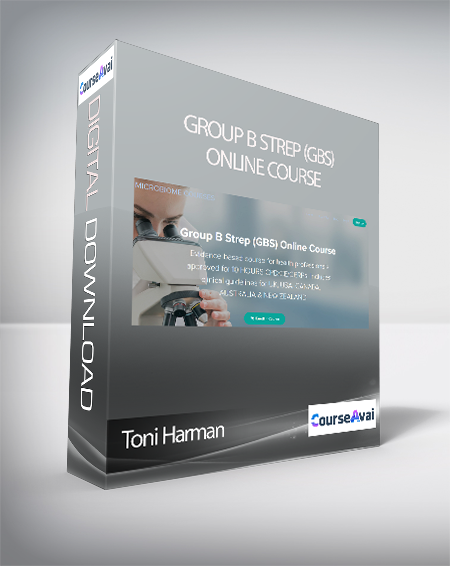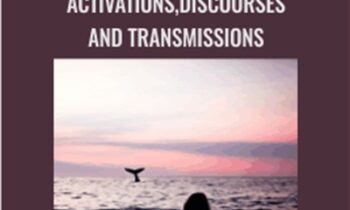$80.00 Original price was: $80.00.$28.00Current price is: $28.00.
Evidence-based course for health professionals approved for 10 HOURS CPD/CE/CERPs. Includes clinical guidelines for UK, USA, CANADA, AUSTRALIA & NEW ZEALAND
 Purchase this course you will earn 28 Points worth of $2.80
Purchase this course you will earn 28 Points worth of $2.80Elevate your skills with the Toni Harman – Group B Strep (GBS) Online Course course, available for just $80.00 Original price was: $80.00.$28.00Current price is: $28.00. on Utralist.com! Browse our curated selection of over 60,000 downloadable digital courses across diverse Business and Sales. Benefit from expert-led, self-paced instruction and save over 80%. Start learning smarter today!
Evidence-based course for health professionals approved for 10 HOURS CPD/CE/CERPs. Includes clinical guidelines for UK, USA, CANADA, AUSTRALIA & NEW ZEALAND
Purchase Toni Harman – Group B Strep (GBS) Online Course courses at here with PRICE $80 $28

Toni Harman – Group B Strep (GBS) Online Course
Group B Strep (GBS) Online Course
Evidence-based course for health professionals approved for 10 HOURS CPD/CE/CERPs. Includes clinical guidelines for UK, USA, CANADA, AUSTRALIA & NEW ZEALAND
“I found this course very helpful. It was very well presented, and I plan to update my informed choice about GBS and it’s risks with some new information I learned.”
– Karen, Home Birth Midwife, Wisconsin, USA
“I wanted to comment on the quality of this course. I found it fantastic”
– Lauren, Medical Student, Canada
“A thorough, convenient course that will help me educate my birth doula clients so they can make the best decisions for their own health and that of their babies.”
– Susan, Birth Doula, San Francisco, USA
“Another amazing course from Toni and the Microbirth Team. I come away from each course motivated and inspired and mostly grateful for such interesting, relevant, and up to date information that I can share with my clients in an easy to understand way. Look forward to the next one!”
– Michelle, Birth Doula, Japan
GROUP B STREP (GBS) ONLINE COURSE
For Health Professionals
Helping YOU feel more confident about group B Strep.
Helping YOU support parents with full informed choice.
Evidence-based with up-to-date references
Easy-to-understand & easy-to-digest
Go-at-your-own pace so you can take days, months or up to 3 years to complete course (and claim your CE credits!)
Learn from 5 world-leading professors and experts
Approved for 10 CPD HOURS / CE credits
Downloadable handouts & Certificate of Completion
Remember, this information can save lives.
Group B Strep is the leading cause
of serious infection (meningitis & sepsis)
in newborn babies.
Aimee was born 23rd July 2011 and very quickly developed early-onset GBS meningitis. Aimee was treated with IV antibiotics and survived. Aimee has severe quadiplegic spastic dystonia cerebral palsy affecting all four limbs, and pseudobulbar palsy affecting her eating and ability to talk. (Photo credit: Aimee’s mother, Charlotte)
Approved Continuing Education for midwives, doulas,
childbirth educators and lactation consultants
Group B Strep (GBS) Online Course has been approved for:
10 CPD HOURS approved by the Australian College of Midwives (ACM)
10 HOURS approved by the Midwifery Council (New Zealand) Alto Films Ltd Approval Number: 2018CME038E
11.0 LAMAZE CONTACT HOURS approved by Lamaze International #LIN 18-14
11.0 CONTACT HOURS accepted by The International Childbirth Education Association (ICEA) #LIN 18-14
10.5 CERPS (8.5 R-CERPs & 2 L-CERPs) approved by the International Board of Lactation Consultants Examiners (IBLCE) CERPs Registry Number 320039K
This course can be used as 10 HOURS CPD for revalidation by the Nursing and Midwifery Council (NMC)
10 HOURS or 1.0 Midwifery CEU credits by the Midwifery Education & Accreditation Council ( Program No MEAC ID #M2021-09-1010DE). These 10 HOURS / 1.0 Midwifery CEUs are applicable for Certified Professional Midwives recertifying through the North American Registry of Midwives (NARM).
If you are a midwife, lactation consultant, doula, childbirth educator or other health professional, the following CPD / CE credits are accepted by many midwifery, nursing, doula, childbirth education orgnanizations including: IBLCE, ACM, ICEA, DONA International, CAPPA and Lamaze International.
Group B Strep (GBS) Online Course
Accredited Continuing Education
from 5 leading group B Strep experts
VICTOR NIZET: Professor & Vice Chair for Basic Research, Department of Pediatrics & Chief, Division of Host-Microbe Systems & Therapeutics. And Professor, Skaggs School of Pharmacy & Pharmaceutical Sciences, University of California San Diego
MEGHAN AZAD: Assistant Professor of Pediatrics and Child Health at the University of Manitoba, Canada. Dr. Azad serves on the Executive Council for the International Society for Research in Human Milk and Lactation, and the Breastfeeding Committee of Canada.
ANITA KOZYRSKYJ: Professor in the Department of Pediatrics, University of Alberta, Canada. Dr Kozryskyj is the PI of SyMBIOTA (Synergy in Microbiota) research program, one of the seven CIHR-funded Canadian Microbiome Initiative teams
PHILIP STEER: Emeritus Professor of Obstetrics, Imperial College London. Dr Steer has authored 135 research papers, and many reviews, editorials and book chapters/books. Former Editor-in-Chief of BJOG – an International Journal of Obstetrics and Gynaecology, he is the current Chair of the GBS Support medical advisory panel.
JANE PLUMB MBE: Chief Executive, Group B Strep Support. A former member of the Department of Health priority setting workshops for GBS research and current member of the International Symposium on Streptococcus Agalactiae Disease scientific committee. Co-vice chair of the Royal College of Obstetricians & Gynaecologists’ Women’s Network.
Evidence-based visual presentations
combined with HD short videos
- For example, from Session 2 on group B Strep in newborns:
Course Content covers:
- Group B Strep and the human microbiome – including the microbial properties and the special virulence factors of GBS (learn what they are in the course!)
- Group B Strep and vaginal birth, C-section and preterm birth
- Explanation of ‘Universal Screening’ and ‘Risk-based’ approaches to prevent GBS infections
- Latest research on maternal IV antibiotics for GBS and the potential impact on the infant microbiome
- Latest research on breastfeeding and group B Strep
- Latest developments about a potential maternal GBS vaccine
- Clinical guidelines to prevent GBS infections for USA, Canada, Australia, New Zealand and UK
GROUP B STREP (GBS)
ONLINE COURSE
USD $80 / AUD $118 / CAD $107 / NZD $125 /
GBP £66 / EURO 73 / ZAR 1223 + local taxes
- This is a one-time purchase. There are no recurring fees.
- Purchase of this course gives you access to the course content for 3 years.
- 10 HOURS CPD / CE / CERPs can be claimed when needed for re-certification.
- The usual price for this course is USD $247 – but we want to make this critical information affordable by all, so we have discounted the price to USD $80 price for a limited time only.
Group Bookings
For groups, the person who makes the purchase will be emailed access codes to distribute to all members of the group. Each group member will use the access code to create their own account. CPD/CEU credits are claimed by each individual upon completion of the course.
For larger groups of more than 10 people, including schools, colleges, universities or organisations, please CONTACT US for a bespoke quote.
- Groups of 10: USD $400 + local taxes
Course Curriculum
Group B Strep (GBS) Online Course
START HERE: GROUP B STREP (GBS) ONLINE COURSE
Hello and welcome!
Connect with us!
Course Instructions
How does the course work?
Note on copyright
Notes on gender and spelling
Legal Disclaimer 1
Legal Disclaimer 2
List of Course Contents
Featured Speakers
Declarations of Interest
Session 1: Introduction to Group B Strep (GBS)
1. Session One: Learning Objectives
2. VIDEO: Why do you care about GBS? (2:56)
3. What is group B Strep?
4. VIDEO: What is group B Strep? (1:06)
5. Microbial properties of group B Strep
6. VIDEO: Microbial properties of group B Strep (5:22)
7. GBS and the human microbiome
8. VIDEO: Group B Strep and the human microbiome (2:19)
9. Carrying GBS in the human microbiome
10. VIDEO: Difference between carrying group B Strep and having a group B Strep infection? (1:24)
11. How is GBS carriage detected?
12. VIDEO: Who is most vulnerable to GBS infections? (1:46)
13. GBS infection in adults
14. Session One: Science References
15. Session One: Graded Test
16. Session One: Downloadable Handouts
17. Session One: Discussion Forum
Session 2: Group B Strep and Newborns
1. Session Two: Learning Objectives
2. VIDEO: GBS infection in newborns: A serious global problem (1:03)
3. Global statistics for carrying GBS in pregnancy
4. VIDEO: How can infants acquire group B Strep during labour and vaginal childbirth? (2:40)
5. How can infants acquire GBS during labour and vaginal birth?
6. VIDEO: How can infants acquire group B Strep after birth? (1:43)
7. How can infants acquire GBS after birth?
8. VIDEO: Risk of a newborn developing a GBS infection (3:22)
9. Risk of a newborn developing GBS infection
10. VIDEO: GBS infection and preterm birth (1:37)
11. GBS infection and preterm birth
12. VIDEO: GBS infection with C-section (0:49)
13. GBS and C-section
14. Session Two: Science References
15. Session Two: Graded Test
16. Session Two: Downloadable handouts
17. Session Two: Discussion Forum
Session 3: Signs Of Early And Late Onset GBS infection
1. Session Three: Learning Objectives
2. VIDEO: Difference between early-onset and late-onset GBS infections (1:47)
3. GBS is a serious risk to infant health
4. VIDEO: GBS is a cause of stillbirth (2:19)
5. GBS is a cause of stillbirth
6. VIDEO: Signs of early-onset GBS infection (1:49)
7. Signs of early-onset GBS infection
8. VIDEO: Signs of late-onset group B Strep infection (1:28)
9. Signs of late-onset GBS infection
10. VIDEO: Diagnosing group B Strep infection (1:06)
11. Rate of GBS infections across the world
12. VIDEO Treating group B Strep infection with antibiotics (1:45)
13. Treating GBS infections with antibiotics
14. VIDEO: Morbidity and mortality rates for GBS infection (2:27)
15. Key morbidity and mortality statistics from around the world
16. Session Three: Science references
17. Session Three: Graded Test
18. Session Three: Downloadable Handouts
19. Session Three: Discussion Forum
Session 4: Strategies For Preventing Early-Onset GBS Infection
1. Session Four: Learning Objectives
2. VIDEO: With no symptoms, how can you tell if you are a carrier for GBS? (1:38)
3. Types of test for GBS during pregnancy
4. VIDEO: Types of test for GBS carriage (2:14)
5. ‘Risk-based’ and ‘Universal testing’ strategies for GBS
6. VIDEO: What is the ‘Risk-based’ approach for GBS during pregnancy? (2:43)
7. What is a ‘Risk-based’ approach to GBS during pregnancy?
8. VIDEO: What is ‘Universal screening’ for GBS during pregnancy? (2:14)
9. What is ‘Universal screening’?
10. VIDEO: Procedure for testing mother for GBS at 35-37 weeks’ gestation (1:54)
11. If a woman tests positive for carrying GBS
12. VIDEO: Effectiveness of ‘Universal Screening’ compared to the ‘Risk-based approach’ for GBS (1:19)
13. Which approach is more effective?
14. Session Four: Science References
15. Session Four: Graded Test
16. Session Four: Downloadable Handouts
17. Session Four: Discussion Forum
Session 5: Preventing GBS Infections With IV Antibiotics
1. Session Five: Learning Objectives
2. VIDEO: Preventing GBS infections with antibiotics (1:29)
3. How effective are Intrapartum Antimicrobial Prophylaxis (IAP) at preventing early-onset GBS infections
4. VIDEO: When are Intrapartum Antimicrobial Prophylaxis (IAP) administered? (0:47)
5. When are Intrapartum Antimicrobial Prophylaxis IAP administered
6. VIDEO: How are Intrapartum Antimicrobial Prophylaxis (IAP) administered? (1:19)
7. Which antibiotic at what dosage?
8. VIDEO: What if a mother is allergic to penicillin? (0:43)
9. Severe reaction to penicillin (anaphylaxis)
10. VIDEO: Risk of serious anaphylactic allergic reaction to antibiotics? (1:03)
11. Observe baby rather than IAP
12. VIDEO: Observe baby rather than IAP (1:07)
13. Session Five: Science References
14. Session Five: Graded Test
15. Session Five Downloadable Handouts
16. Session Five: Discussion Forum
PART TWO: GUIDELINES FOR UK, USA, CANADA, AUSTRALIA AND NEW ZEALAND
1. Session Six Learning Objectives
2. Session 6: Updates and Disclaimer
3. Session Six: Reminder of clinical terms
Session 6: Guidelines for UK
6a UK RCOG Green–top Guideline No. 36 2017 – Summary of some points from guidelines
6b. UK RCOG Green–top Guideline No. 36 2017 – List of clinical risk-factors
6c. UK RCOG Green–top Guideline No. 36 2017 – Explanation of antibiotic dosage
6d. UK RCOG Green–top Guideline No. 36 2017 – Summary of risk-based approach if mother is in labour
6e. UK RCOG Green–top Guideline No. 36 2017 – Induction membrane sweeping or Caesarean
6f. UK RCOG Green–top Guideline No. 36 2017 -Summary after baby is born
Session 6: Downloads for Guidelines for UK
Session 6: Guidelines for USA
6a. USA ACOG 2019 Summary of key points from guidelines
6b USA ACOG 2019 If the prenatal GBS culture is positive
6c USA ACOG 2019 If the prenatal GBS culture result is unknown
6d USA ACOG 2019 If allergic to penicillin
6e USA ACOG 2019 Obstetric interventions should not be delayed
6f USA ACOG 2019 If preterm labour or rupture of membranes before 37 weeks
6g USA ACOG 2019 Summary of when IAP indicated
6h USA ACOG Committee Opinion 797 – Feb 2020
6i USA ACM Guidelines March 2020
6j: USA AAP Clinical Report July 2019
Session 6: Downloads for Guidelines for USA
Session 6: Guidelines for CANADA
6a Canada SOGC 2018 Summary and statement
6b Canada SOGC 2018 Recommendation No. 1 Universal Screening
6c Canada SOGC 2018 Recommendation No. 2 IAP for GBS
6d Canada SOGC 2018 Recommendation No. 3 Preterm or rupture of membranes
6e Canada SOGC 2018 Recommendation No. 4 Intrapartum fever and chorioamnionitis
6f Canada SOGC 2018 Recommendation No. 5 Antibiotic susceptibility testing
6g Canada SOGC 2018 Recommendation No. 6 Term pre-labour rupture of membranes
6h Canada SOGC 2018 Recommendation No. 7 Unknown GBS status at term and ruptured membranes over 18 hours
6i Canada SOGC 2018 Recommendation No. 8 Preterm pre-labour rupture of membranes
6j Canada SOGC 2018 Recommended antibiotic regimens for intrapartum prophylaxis
Session 6: Downloads for Guidelines for CANADA
Session 6: Guidelines for AUSTRALIA AND NEW ZEALAND
6a Australia and New Zealand RANZCOG 2016 Summary of some points in guidelines
6b Australia and New Zealand RANZCOG 2016 guidelines – Flowchart for risk-factor approach
6c Australia and New Zealand RANZCOG 2016 guidelines – Flowchart for Universal Screening
6d Australia and New Zealand RANZCOG 2016 guidelines – Flowchart for Specific Clinical Scenarios
6e Australia and New Zealand RANZCOG 2016 guidelines – Flowchart for antibiotic dosage for IAP and Conclusion
6f New Zealand Consensus 2014 Guideline – Summary of recommendations
6g New Zealand Consensus 2014 Guideline – Management of newborn babies
Session 6: Downloads for Guidelines for AUSTRALIA AND NEW ZEALAND
Session 6: Science references, test and handouts
Session Six Science references
Session Six: Graded Test
Session Six: Downloadable Handouts
Session Six: Discussion Forum
Session 7: Two Small Studies On The Impact Of Intrapartum Antimicrobial Prophylaxis (IAP) On The Infant Microbiome
1. Session Seven Learning Objectives
2. VIDEO: General thoughts on the impact of Intrapartum Antibiotic Prophylaxis (IAP) on the infant microbiome (3:38)
3. Two small studies comparing impact of IAP on infant gut microbiome
4. VIDEO: Impact of IAP on infants at 3 months of age in the CHILD study (2016) (2:53)
5. Findings of Canadian CHILD Study (2016)
6. VIDEO: CHILD Study (2016): Maternal antibiotics associated with decrease of Bacteroidetes (2:08)
7. Canadian CHILD study – Age 3 months, different bacterial pattern after exposure to maternal IV antibiotics
8. VIDEO: Child health implications of maternal IAP – Risk of food sensitisation? (1:29)
9. CHILD Study (2016) Increased risk of food sensitisation
10. VIDEO: Summary of findings of CHILD Study (2016):IAP and increased risk for food sensitisation (2:13)
11.Session Seven: Science references
12. Session Seven: Graded Test
14. Session Seven: Downloadable Handouts
15. Session Seven: Discussion Forum
Session 8: Evidence For Other Strategies To Prevent GBS Infections
1. Session Eight Learning Objectives
2. VIDEO: IAP for every pregnant woman (1:19)
3. IAP for every pregnant woman
4. VIDEO: Eradicating GBS carriage during pregnancy? (2:24)
5. Can GBS carriage be eradicated?
6. VIDEO: Can probiotics reduce GBS colonisation? (0:57)
7. Do probiotics reduce GBS colonisation?
8. Session Eight Science references
9. Session Eight: Graded Test
10. Session Eight: Downloadable Handouts
11. Session Eight: Discussion Forum
Session 9: GBS and Breastfeeding
1. Session Nine: Learning Objectives
2. VIDEO: How does breastfeeding impact GBS? (2:01)
3. Can breastfeeding modify changes from maternal IV antibiotics given before birth?
4. VIDEO: Can breastfeeding help ‘restore’ the compositional changes in the infant microbiome? (2:42)
5. Could breast milk help prevent GBS infection in babies?
6. VIDEO: Summary of impact of breastfeeding after exposure to antibiotics (0:49)
7. Session Nine: Science references
8. Session Nine: Graded Test
9. Session Nine: Downloadable Handouts & Extra Reading
10. Session Nine: Discussion Forum
Session 10: Potential For A Future Vaccine To Prevent GBS Infections
1. Session Ten Learning Objectives
2. VIDEO: Possibility of a vaccine to prevent GBS infections? (2:47)
3. Maternal vaccines for Pertussis, Neonatal Tetanus, Respiratory Synctial Virus (RSV) and Pneumonia
4. VIDEO: Could a vaccine help prevent GBS infections? (1:52)
5. A maternal vaccine for GBS
6. VIDEO: Progress with GBS vaccine research (5:25)
7. IV antibiotics would still be needed
8. VIDEO: How soon could a GBS vaccine be ready? (2:02)
9. GBS vaccines in development
10. VIDEO: What is your take-home message? (2:03)
11. Session Ten Science references
12. Session Ten: Graded Test
13. Session Ten: Downloadable Handouts
14. Session Ten: Discussion Forum
Session 11: Downloadable Handouts, Student Evaluation and Certificate of Completion
1. Session Eleven: Course Downloadable Handouts
2. Group B Strep (GBS) Online Course: Student Evaluation Form
3. Group B Strep (GBS) Online Course: Discussion Forum
4. Group B Strep (GBS) Online Course: Certificate of Completion
4b. Midwifery Council (New Zealand) – Certificate of Completion, Reflection Forms, Course Schedule and Reference List
WANT MORE?
Join our other courses
Final thoughts
Purchase Toni Harman – Group B Strep (GBS) Online Course courses at here with PRICE $80 $28
Cultivate continuous growth with the Toni Harman – Group B Strep (GBS) Online Course course at Utralist.com! Unlock lifetime access to premium digital content, meticulously designed for both career advancement and personal enrichment.
- Lifetime Access: Enjoy limitless access to your purchased courses.
- Exceptional Value: Benefit from savings up to 80% on high-quality courses.
- Secure Transactions: Your payments are always safe and protected.
- Practical Application: Gain real-world skills applicable to your goals.
- Instant Accessibility: Begin your learning journey immediately after buying.
- Device Compatible: Access your courses seamlessly on any device.
Transform your potential with Utralist.com!
Related products
Business and Sales
= 48 Points
Business and Sales
= 33 Points
Business and Sales
“10 Best” Diamond Aloha Activations, Discourses and Transmissions – Jacqueline Joy
= 83 Points
Business and Sales
= 123 Points
= 224 Points
Business and Sales
= 45 Points
Business and Sales
= 93 Points












